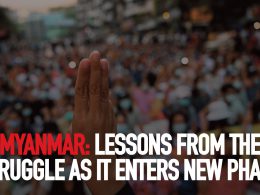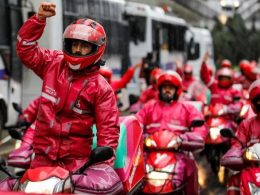The first day of 2010 saw Hong Kong’s pro-democracy movement hit the ground running. On 1 January the crowds of demonstrators exceeded the organisers’ expectations, in a massive protest setting the tone for what could be an explosive political year in Hong Kong – and China. Instead of the 10,000 hoped for, 30,000 took part.
The high turnout indicates massive popular opposition to the Hong Kong government’s fraudulent electoral reform plan, which effectively shelves the introduction a one-person-one-vote electoral system. If the crowds, including large numbers of young people, can now be organised into a genuine mass movement against the government’s plan and for real democracy, this represents the best possible start to a crucial year of struggle.
“I don’t want fake democracy. I want genuine universal suffrage,” proclaimed Lee Cheuk-yan, Legislative Council member and General Secretary of the Confederation of Trade Unions (HKCTU). “The strong turnout means that we will raise the temperature in our dealings with the government.”
The government’s plan, made public in November, preserves the archaic and undemocratic “functional constituencies” that give 200,000 elite voters – bankers, stock brokers and property developers – extra weighting in the Legislative Council. According to a study by the Human Rights Monitor, a ballot cast by the average voter in the elite functional constituencies is worth 15,940 ordinary ballots cast by the general population. This system is defended by the government camp as “universal suffrage with Chinese characteristics”. In fact, it was introduced into Hong Kong by the British colonial rulers for elections to their puppet city council. Since reunification the same system has been embraced by China’s “communist” one-party state. Comprising a largely decorative “parliament” that exerts no control over government, strict limits on who can run for top office, and undisguised corporate voting, Hong Kong’s system resembles the corporatist structures introduced by Mussolini’s fascist regime in Italy.
In the run up to the next scheduled elections in 2012 a battle royale is unfolding. On one side the government of Donald Tsang, a proxy for Beijing, and its supporters especially among the wealthy tycoons, are fighting to preserve the existing system, “corporate votes” and all! Their main argument is that the Beijing dictatorship will not endorse any move towards genuine universal suffrage before 2020. On the opposite side are an array of pan-democratic parties and campaign groups determined not to accept a veto from Beijing.
After years of stonewalling, evasion and broken promises by the Hong Kong government, its latest “blueprint” makes clear that universal suffrage in any meaningful sense is not on offer to the people of Hong Kong. As the Financial Times (UK) put it in an editorial: “Hong Kong’s road to universal suffrage is turning out more arduous than the Red Army’s famously circuitous Long March. That lasted only 370 days; at this rate, Hong Kong will not have true democracy for decades to come.” (FT 7 December 2009)
The reason for this “arduous road”, obscured by the FT and other big business journals, is the entrenched resistance to any genuine democratic opening from a coalition of two powerful forces. One is Hong Kong’s capitalist elite that jealously guards its privileges and super-profits in the “world’s freest economy”. The other is the Beijing dictatorship, which fears and distrusts everything it does not fully control, and sees a huge potential for political “contagion” from Hong Kong to other parts of China. This is why socialists stress that the struggle for genuine democratic rights is linked to the struggle to overthorw capitalism and establish democratic control over the economy as well as government. Socialists and the supporters of chinaworker.info also stress that this struggle cannot be waged only in Hong Kong, but must be linked to mass anti-capitalist and democratic struggle in China and globally.
The realisation that Hong Kong’s population have been “marks” in a gigantic confidence trick has produced massive anger, frustration and a search for ways to ramp up the struggle for democracy. As the 1 January demonstration shows many in Hong Kong are also increasingly alarmed over the growing crackdown on dissent in China. The vicious 11 year jail sentence imposed by a Beijing court on dissident Liu Xiaobo one week ago undoubtedly acted as a further catalyst for the high turnout on the Hong Kong demonstration. Placards and chants for the release of Liu Xiaobo were almost as prominent as calls for one-person-one-vote. A string of recent incidents has also shown how fragile Hong Kong’s judicial and political autonomy is becoming as the Beijing regime increases its censorship and control throughout China. A protest in support of Liu Xiaobo last week at the Hong Kong-China border resulted in mainland Chinese police officers allegedly crossing onto the Hong Kong side of the border and arresting several protesters and two Hong Kong journalists. If the claims are proven this represents a serious violation of Hong Kong’s territorial autonomy.
These factors have produced a shift in popular perceptions. Many now realise that the battle for democracy in Hong Kong cannot be separated from the struggle inside China to end one-party rule. Many are also now questioning the role of “moderate” pan-democratic leaders who have hitherto stressed working “within the system”. The finishing point of the 1 January demonstration, the Central Government Offices, was different from previous major democracy marches reflecting a shift of target to the central government, which pulls the strings, and away from its puppet Donald Tsang.
A heated debate has erupted within the pan-democratic bloc over how to defeat the government’s “reform” and advance the struggle for genuine universal suffrage. The radical wing of the bloc, the League of Social Democrats and the Civic Party, are planning to force a “referendum” on universal suffrage by resigning one seat in each of the five geographical constituencies. The leaders of the two parties have called for the recruitment of 10,000 “universal suffrage campaigners” as a basis for the referendum campaign, and have invoked the idea of “people’s power”. In December, the leaders of the largest pan-democratic party, the Democrats, voted against participating in the resignation campaign arguing that Beijing would not heed the result whichever way it went. Supporters of the resignation plan do not pretend that such a “referendum” would have a legal validity, but instead put this forward as a means to mobilise public opinion against the government and its “reform”.
Despite its rejection of the by-election plan, the Democratic Party establishment is stung by growing criticisms of its passivity. It took part in the 1 January demonstration and has even floated the idea of a hunger strike (nothing new in Hong Kong) in an attempt to burnish its “fighting” credentials. A minority of “reformists” inside the Democratic Party are openly campaigning in favour of the by-election plan. A split in this party which formerly dominated the pan-democratic movement cannot be excluded in the stormy period ahead. The tiny numbers involved in its vote against the by-election tactic – by 220 votes to 54 – shows how far removed this party is from the type of mass campaigning force necessary to lead to successful struggle for democratic rights.
For the Beijing regime, the unfolding democracy struggle presents enormous challenges, coming at a time of serious economic dislocation amid the global capitalist crisis. Four days before the New Year demonstration, the Chinese regime issued a thinly disguised rebuke to Donald Tsang, telling him to resolve “deep-rooted conflicts”. But it is Beijing itself that prohibits any flexibility on Tsang’s part, locking him into a collision course with growing sections of the Hong Kong population. The democracy struggle raises the question of who – which classes and economic interests – rules society? It is also linked to all the major social issues such as galloping inequality, low wages and environmental destruction.
This was confirmed by the composition of the 1 January demonstration. While the headline issue was democracy, participants included children and parents living under welfare, “Lehman Brothers’ victims”, villagers opposing the new Guangzhou-Hong Kong high-speed rail link, and other protest groups. “It doesn’t matter what the march is about, we just want to vent our anger,” one marcher told the South China Morning Post.
Through its blind stupidity and inflexibility, the Beijing regime risks triggering a mass social movement in its richest constituent part. It also runs the risk of a substantial political “blowback” into mainland China itself from the rotten undemocratic practises it now wishes to impose on Hong Kong.
chinaworker.info and the supporters of the Committee for a Workers’ International (CWI) believe the struggle for universal suffrage and full democratic rights is linked to the struggle to sweep away the crisis-ridden capitalist system. We are fighting for:
* Elections in 2012 on the basis of one-person-one-vote!
* Abolish the functional constituencies immediately!
* Replace the rubber-stamp Legco with a genuine People’s Assembly with powers to tax the super-rich, abolish poverty, implement a decent minimum wage, reverse privatisations, and create real jobs!
* The right to vote at sixteen years of age – including migrant workers!
* For elected representatives to be paid only a skilled worker’s salary, plus legitimate running expenses open to public inspection – no privileges for politicians and officials!
* For a mass campaign based on the creation of action committees in workplaces and colleges, to include mass actions, walkouts and strikes, in order to build irresistible pressure behind these demands. Electoral tactics should flow from such an ‘extra-parliamentary’ approach.
* For public ownership under full democratic control of the banks and big companies, and the adoption of democratic socialist policies as the only way to permanently secure democratic rights and eradicate the deep crisis of the capitalist system.












